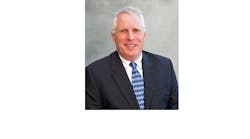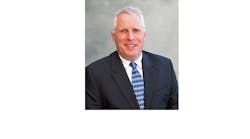The worst feels like it's over, but the economy is wobbling forward in a confusing cycle of fits and starts. Bullish economic indicators like the Purchasing Managers Index, the EBCI Index published by the National Electrical Manufacturers Association, Rosslyn, Va., and the Conference Board's Leading Economic Indicators are encouraging, but then there's a flurry of bad news: reports that Walmart will lay off 11,200 at its Sam's Club subsidiary; Home Depot is slashing 1,000 corporate jobs; and Macy's is cutting 1,500 more positions.
We certainly are at a confusing juncture right now. I think Neil Gillespie and Allen Ray nailed the general mood of the electrical industry best with the title of their current series in Electrical Wholesaling: “Out of the Fire.” We are living in the aftermath of a devastating forest fire that burned the jobs of co-workers, family and friends, our retirement plans and our sense of economic well-being and security. And we are still smarting from what we have been through over the past 18 months or so. But just as Gillespie and Ray found out in their research for this series of articles (see page 28 for this month's installment), hope springs anew among the ashes.
Because as bad as it has been, many if not most of us have survived. We are battered and bruised by the experience, working a lot harder and stretched a bit thinner because of the need to do more with less. But if you are reading this article, chances are pretty good that you and your company have survived the fire (or at least can still afford the price of a subscription to Electrical Wholesaling). You can't discount the pain involved in the rumblings in the rep world about firms merging, but surprisingly few distributors, manufacturers or reps have gone out of business in what was by all measures the worst recession in the last 70 years.
The zillion-dollar question is where do we go from here. Depending on your own particular mix of business, 2010 will probably offer no better than a few points of growth. And if you are totally tied to the ups-and-downs of the commercial construction market, you may very well have to wait until 2011 before you see sales improve. Herm Isenstein, president, DISC Corp., Orange, Conn., said in recent article in Electrical Wholesaling (page 34, Nov. 2009), that he is forecasting the contractor market segment to be down more than 10 percent in 2010, but that he expects the industrial market segment to show slight growth.
Economist Alan Beaulieu, president, Institute for Trend Research, Bascawen, N.H., is becoming a familiar face on the podium at distribution industry conferences. He spoke at the 2010 Executive Summit of the National Association of Wholesaler-Distributors (NAW), in Washington, D.C., last month and is on the program at the NEMRA's annual conference this month in New York.
Beaulieu is encouraged by some of the leading economic indicators he tracks, and says better times are not that far down the road. “Inventory replenishment is starting,” he said at NAW. “2010 is that rocky bottom where the second half is better than the first. Commercial construction will have to wait until 2011.”
In the not-so-good-news department, he expects inflation to hit 6.5 percent in 2011, but expects it to stick around the 3.5 percent mark this year. “Inflation is coming, and it will show up in commodities first,” he said. Because of his concerns about inflation, he urged meeting attendees to make their capital equipment expenditures and/or building purchases in 2010, before prices go up.
Don't break your arm patting yourself on the back because you survived this mess. Take some time to analyze what has helped you and your company persevere — or if you didn't make it through, what sunk your ship. Then build on your strengths.
This issue of Electrical Wholesaling does a particularly good job of helping readers do exactly that. “Out of the Fire” will teach you how to fortify your company's core operations and strengths and identify new growth niches. The cover story, “Slicing Into the Solar Chain” (page 20), will help you analyze whether or not the photovoltaics market might work for your company as a niche business. “Data-Driven Quality” (page 35), by Beth Badrakhan, will help you get more out of your company's data, and Mike Dandridge's fine article, “The Elements of Mass Persuasion” (page 37), will help you refine your counter operations.
Times may be tough, but we are in the final stages of this recession and it's time to position your company for the recovery. The sidebar on the previous page offers a glimpse into the philosophy of Caliper's Herb Greenberg for business success. The one tip that hit home with me is the importance of surrounding yourself with “can-do” people. In his NAW seminar, he and Patrick Sweeney also got into an interesting riff on how pessimists sap your energy because they don't offer any constructive ideas and really just want someone to listen to their constant stream of complaints.
At Electrical Wholesaling, we strive to offer real-world “can-do” solutions to your company's business challenges. I believe this issue does a nice job of accomplishing that editorial mission.
Five Ideas to Get the Blood Flowing Again
What's at the very core of what it takes to succeed in this economy? Many people overlook the importance of your basic attitude on life.
At the recent NAW meeting, Herb Greenberg, founder and CEO, and Patrick Sweeney, president, of consulting firm Caliper Corp., Princeton, N.J., offered some timeless tips on why some people succeed and others fail in business and in life. Much of their business entails selling personnel evaluation tools that businesses use in the hiring process. In the thousands of potential employees they have tested for clients, the following five key personality traits rose to the top.
Competitiveness
Sure, all salespeople like to compete, but Greenberg says they need to know how to channel their competitive juices positively on the playing field and not against people in their own companies.
Self-discipline
You need to focus on the opportunities that really matter and let the rest go.
Optimism
If you have 50/50 shot at something, do you take it? If you do, you are an optimist. Surround yourself with optimistic, can-do people.
Resilience
The most resilient business executives absorb challenges and bounce back stronger than before.
Love your work
You spend too much of your life trying to make a living. If you don't love what you do, find a different profession.






